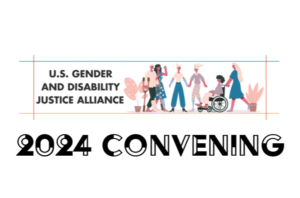Calling Up Justice Producer Jesenia @NeuroSpicyNetworking attended this amazing Disability Justice Convening hosted by Women Enabled International.
Invite to the Alliance
My journey into the US Gender & Disability Justice Alliance was a testament to the power of virtual activism. A member of the Alliance attended one of our Virtual Protests, witnessing the impactful work in creating accessible virtual events for ongoing activism. This connection paved the way for my invitation to the Alliance, and subsequently the Convening last week. The Alliance is a disability justice-oriented collective uniting women, nonbinary individuals, and gender minorities with disabilities for advocacy and education. Through virtual meetings, social events, and shared advocacy tasks, we create a supportive space addressing discrimination intersections and promoting accessibility.
Accessibility Success
Navigating pandemic travel has exposed profound challenges for us in the disability community, echoing the Ugly Laws mentality and underscoring the need for robust advocacy. Our rights, inadequately protected under the ADA, demand urgent attention. Systemic barriers, perpetuating poverty among the disabled, reinforce the imperative for justice. Amidst these struggles, the fight for disability justice intensifies. The lack of precautions is magnified during travel in a current surge of 2M new infections daily, and the lack of masking due to a prevailing sentiment that the “pandemic is over.”
Accessibility can triumph even in adversity, as witnessed at the Women Enabled International Alliance Convening, setting a gold standard with comprehensive, clear, and accessible processes—virtual and in-person. It’s a benchmark for all conferences.
- A comprehensive agenda updated throughout the whole process.
- Clear instructions and superb communication practices.
- Ensuring all the spaces were accessible and managing issues ahead of arrival.
- Offering both virtual and in-person spaces.
- Adhering to COVID precautions & Masks Required!
- Diligently ensuring everyone’s needs were met.
This should be the benchmark for all conferences.
Convening Conversations
The event kicked off with introductions and a chance to get to know each other. A thorough review of senators’ offices and scheduled meetings ensued, covering breakdowns of issues, and bills. We reviewed our prepared talking points, coordinated speakers and attendees, and we were provided detailed notes post meeting, ensuring clarity and preparation. We also spent some time reviewing stories to share with the legislators about our lived experiences and coding the collection of more stories as part of the ongoing storytellers project.
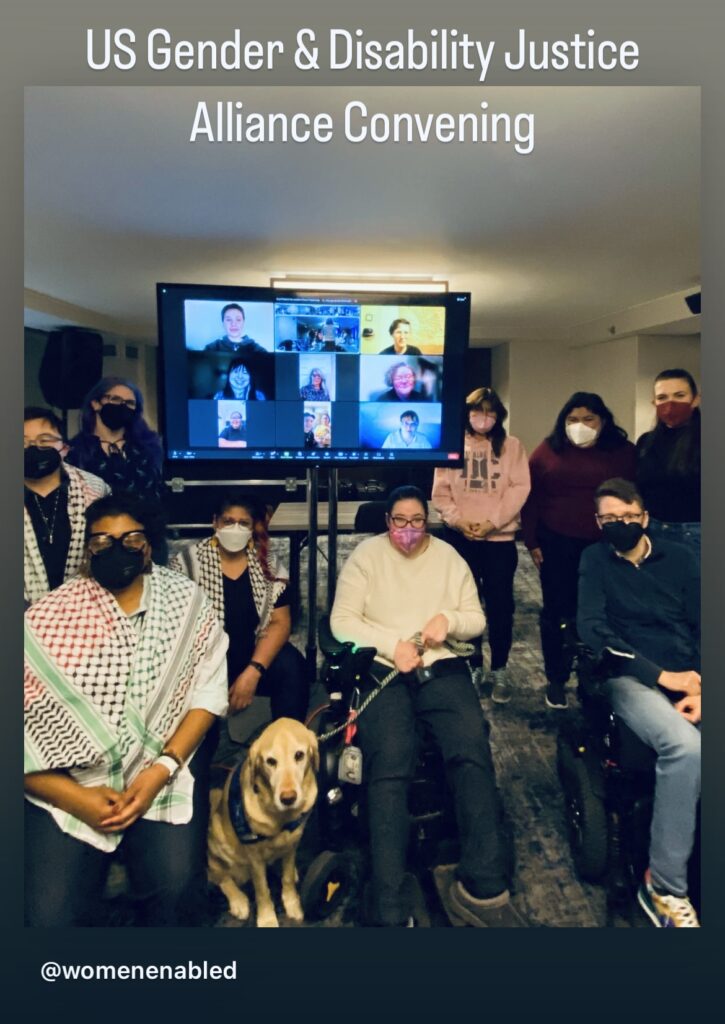
Lobbying Legislators
The Alliance went to DC to share important information with Senators about access to sexual and reproductive healthcare for women and gender diverse people with disabilities and access to home and community services.
Two critical topics:
Sexual and Reproductive Healthcare:
Women, nonbinary people, transgender people, and other gender diverse people with disabilities face many disparities in access to sexual and reproductive healthcare. Disabled people who are multiply marginalized such as Black and Indigenous people and LGBTQIA+ people with disabilities often face compounding and intersecting barriers.
- Disabled individuals have lower cancer screening, higher maternal mortality (11x more).
- Face inaccessible facilities, culturally incompetent professionals.
- Denied autonomy via guardianship.
- Restrictions on decision-making power.
- Forced Sterilization still legal in 31 states.
- Targets disabled, POC, and poor individuals.
Recommendations to Senate:
1. DOJ recognition and policy changes.
2. Address disparities, share experiences.
3. Highlight challenges for multiply-marginalized individuals.
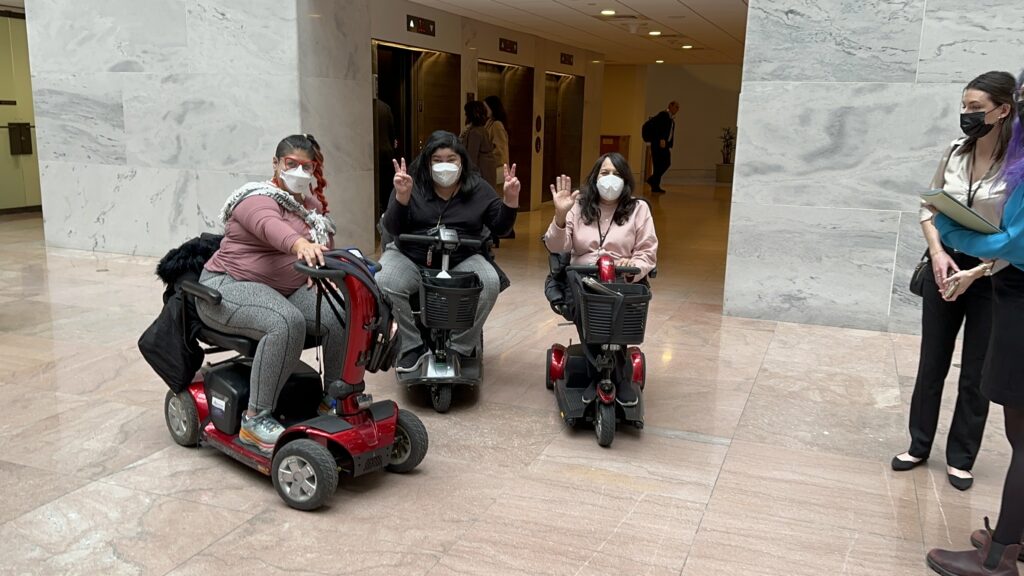
Home and Community-Based Services (HCBS):
Investing in robust (HCBS) not only addresses social disparities but is also a strategic move for healthcare efficiency. By meeting diverse needs, especially those of women of color, HCBS promotes preventive care, reducing reliance on emergency services and costly institutional care. This not only benefits community well-being but also results in long-term savings, making it a prudent investment for both health and fiscal savings.
- HCBS, vital for disabled individuals, spotlight disparities:
- 85% of HCBS direct care workers are women; 53% women of color.
- Majority earn <$20 per hour; 44% of women of color below the poverty threshold.
- Many HCBS workers have disabilities.
- LGBTQ+ individuals face increased access barriers.
- Inequities persist for people of color in HCBS access and quality.
Recommendations to Senate:
1. Ensure robust Medicaid HCBS funding for workforce growth and equitable access.
2. Mandate Centers for Medicare and Medicaid Services (CMS) to publish disaggregated data on disability, race, and gender in HCBS.
3. Advocate for competitive wages, benefits, and expanded HCBS state plan benefits.
4. Make HCBS transportable across states temporarily to avoid service gaps.
5. Urge Department of Health and Human Services (HHS) to adjust poverty guidelines for easier access to HCBS and program qualification.
We ended the day of advocacy with a visit to Capitol Hill that offered insight into the political hub, providing a tangible connection to the legislative process.
Community & Culture
We commenced with a delightful lounge session networking with fellow Alliance members, reveling in the joy of mutual acquaintance, diverse projects, and the prospect of future collaborations. Our lunch became a heartfelt gathering, expressing gratitude for shared endeavors, acknowledging the healing power of a shared meal in community. The visit to the African American Museum, complete with scooters, left a profound impact, unveiling the significance of Black joy and culture. Seeing the impact and influence of descendants of enslaved Africans stolen from their indigenous lands highlights our education system’s glaring oversight regarding Black communities’ importance. We ended the day at Oh Naan, where disability solidarity and joy permeated our dinner conversation, a tapestry woven with tales of resilience, daily struggles, and shared laughter over delicious Indian cuisine at a local accessible DC restaurant.
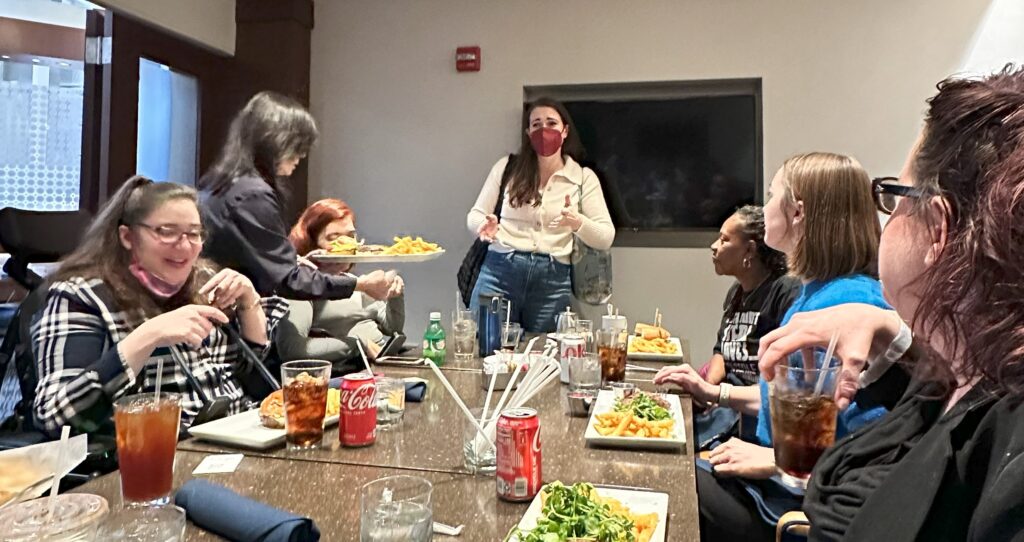
Reflections & Impact
Reflecting on this convening with Women’s Enabled International and the profound impact of this vital work, it’s evident that the intersectionality woven throughout was a driving force. The seamless accessibility provided a welcoming environment, but it was the sense of community with fellow disabled activists that truly felt like coming home. The shared joy, both as people of color and disabled individuals, became a revolutionary act of resistance, affirming the principle of “nothing about us without us.” Networking with influential figures and being valued for our lived experiences fostered a powerful advocacy for our community through a disability justice lens. The cross-disability and cross-movement solidarity experienced were moving and impactful, reinforcing the collective effort against ableism and systemic oppression.
Recognizing that our community, the largest minority globally, is growing due to ongoing disabling events, adds urgency to our collaborative endeavors. Stories shared during the Alliance Convening revealed the stark challenges, like the horrors of traveling for power chair users, or lack of access to Home and Community Based Services, emphasizes the vital need for systemic change. I look forward to the continued work the Alliance will do to support our community in advocating for disability justice!
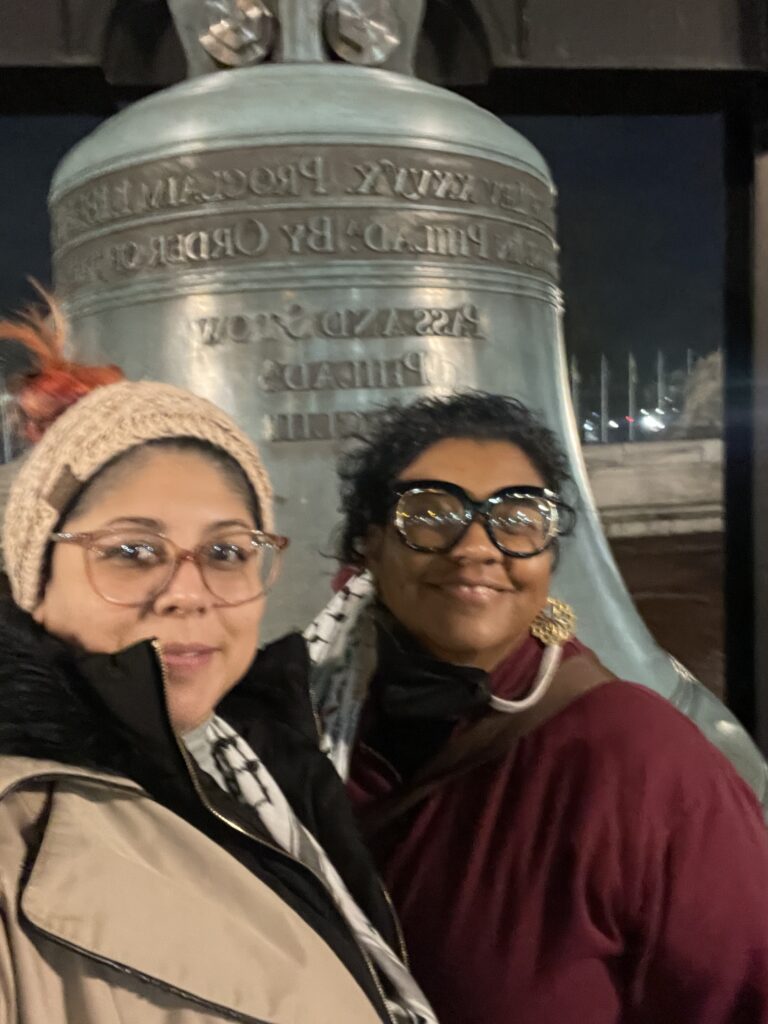
About the Author
Jesenia, a collaborator with Calling Up Justice and cofounder of One Free Community, is working to build a more equitable and inclusive world via collective action by building communities. Learn more on her Website or Read Jesenia’s Bio.

